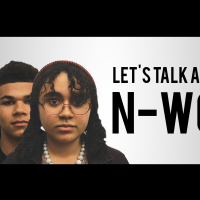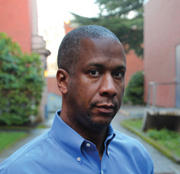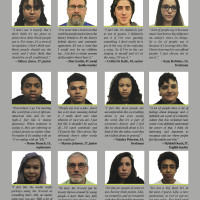[aesop_parallax img=”http://grantmagazine.com/wp-content/uploads/2016/02/kplx21.jpg” parallaxbg=”on” parallaxspeed=”1.3″ caption=”The Grant High School senior believes that both recognition of history and reclamation of the N-word are necessary for society to move forward.” captionposition=”bottom-left” lightbox=”off” floater=”on” floaterposition=”left” floaterdirection=”up”]
Kyra Orr was sitting in a semicircle of chairs in Jefferson High School’s band room the first time she encountered the N-word.
It was January, and she was preparing to perform in a local play in celebration of Black History Month. Orr was 12 at the time and reading along in her script of “Who I am; Celebrating Me” with the other members of the cast.
In a scene about racism in the South, Orr was reading one of her lines and stumbled to get the words out. “Thou cuts not a figger, you are a nig…nigger, and that is the law of Jim Crow,” she muttered.
She remembers hesitating and looking at her director, unsure if it was OK for her young self to speak aloud a version of a word she had always been taught not to mess with.
“I heard it a lot but I never heard that version,” says Orr now, reflecting on the experience. “A lot of stuff was going through my head. ‘Can I say that? Will I get in trouble?…I can’t say it. Please don’t make me say this.’”
Orr’s director eventually allowed her to swap lines with another cast member, but her experience with the word didn’t end there.
As Orr has grown older, the N-word has remained a consistent piece of her vocabulary. It’s been used by members of her dad’s side of the family for as long as she can remember, thrown around at parties and family get-togethers as a term of endearment or a greeting.
Now 18, Orr uses the word colloquially to embrace a friend or make a joking statement. She says she understands that the history behind it isn’t simply pulled apart from the word. Still, she’s adamant about the importance of reclaiming it.
“Every time I think about reclaiming the word, I think about like, ‘If you can reclaim queer, why can’t we reclaim the N-word?’” she says of the LGBTQ community’s attempts to mollify a once-damaging slur used against gays.
“Yes, it’s a word that definitely took us down…but let’s flip the script,” Orr says of the N-word. “Let’s use it to our advantage. It comes from a place (of) vulnerability, weakness, like being stepped over…Reclaiming it is us thinking like, ‘You know what? We went through this. We struggled. We’re gonna take upon it ourselves, because…we’re not the images we’re shown every day on TV or in music lyrics or whatever.’
“We each want to strive to be something, and I think it’s honestly about time that we have something that…makes people forced to see us and know that we’re not going anywhere.”
Orr recognizes her opinion is unpopular with some. “You can’t just ignore history,” she admits. “I mean that was a word that was being thrown around to just tear us down, make us feel weak, less than human, since we were apparently three-fifths of a human being.
“So, no, you can’t get rid of that history…It’s there. Etched in stone. Don’t even try to like sugar coat it. Don’t walk around it. You can’t. It happened.”
Orr doesn’t think doing away with the word altogether would solve anything, and in some ways she feels there are more important conversations that people in the Grant community and across the country should be having about race.
“Honestly, what they tell you on TV or in the history books,” Orr says, “That we come from slavery and we come from broken homes and broken families and all that other stuff? We honestly didn’t. We didn’t start from slavery…slavery is not the only thing behind that word…We come from royalty. We are kings, queens, princesses, princes…We got taken and we couldn’t change that.
“I think we really can reclaim the word and turn it into something positive,” she says, “because we did not go through all that just to be here and not like gain something. I feel like it can make us stronger if we…reclaimed the word.” ◊




